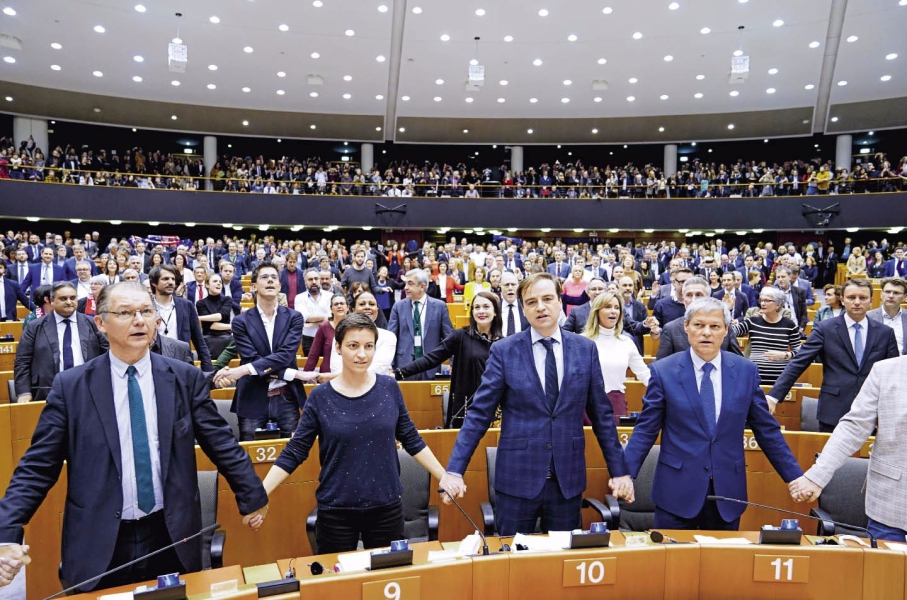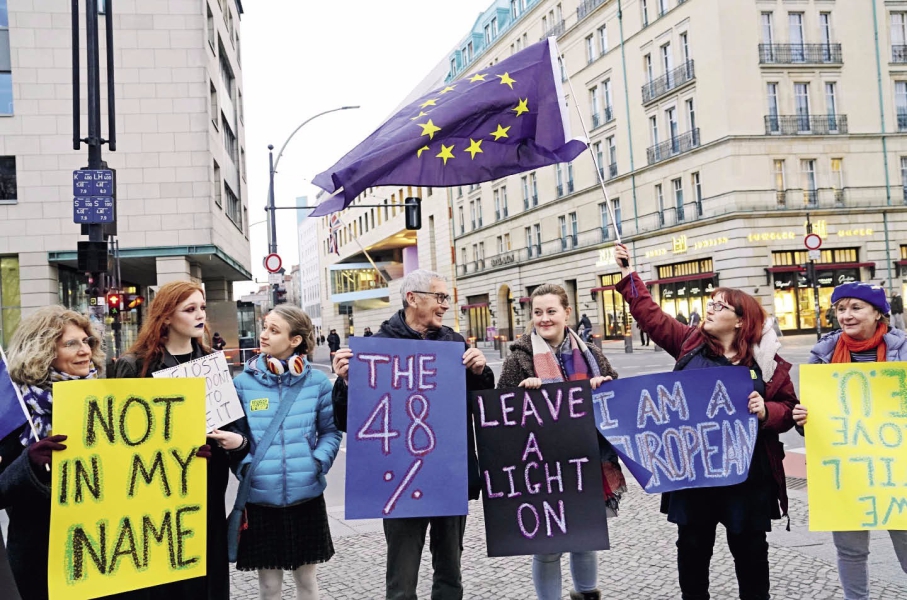___________
WU XU and ZHANG SHUO are reporters with the China News Service.

The European Parliament voted in favor of Britain’s withdrawal agreement on January 29. As the bill was passed, the members of the European Parliament got together in the chamber and sang the Scottish traditional song “Auld Lang Syne” which spoke of friends never forgetting their “old acquaintance” or drifting apart.
“This is not an end, but a beginning,” British Prime Minister Boris Johnson quoted the maxim from former British Prime Minister Winston Churchill when addressing the British people on the Brexit day. From the country’s attempts to establish close connections with the European continent in the 1960s to the final departure from the EU after several twists and turns, the story between the two sides is to be continued. During the next 11-month transitional period, what will happen to the chaotic relationship between the two sides? How will the U.K., EU, and the world deal with a post-Brexit era?
Restarting UK-EU Relations
The U.K. is the first country who has chosen to leave the EU. With several British national flags slowly descending, the EU Council building in Brussels ushered in a major and calm moment late at night on January 31, 2019.
The EU might be reluctant. According to David Sassoli, president of the European Parliament, although the U.K. left the EU, it is still part of Europe. Bidding a sad adieu to the first country to leave the EU, French President Emmanuel Macron called Brexit a “historic alarm signal” that should force the European Union to improve itself.
In contrast, the U.K. has more expectations for the future. Nigel Farage, leader of the Brexit Party and a member of the European Parliament, waved the British flag when saying goodbye to the EU. The British administration specially prepared a wealth of celebrations including a light show in front of 10 Downing Street, the office of the British Prime Minister, and the issuance of commemorative coins with the inscription, “peace, prosperity, and friendship with all nations.” “This is the moment when dawn breaks and the curtain rises for a new act,” British Prime Minister Boris Johnson said when addressing the British people on the Brexit Day. “It is a moment of real national renewal and change,” he said, calling his people to unity.
“Unity” in this period of time in the U.K. has become an unattainable “expectation.” From the endless debates in the parliament to the never-ending protests from the public, the voices against “Brexit” are endless. The British newspaper The Guardian commented that the lengthy “Brexit” war ended an endless chapter in the country’s history, but opened a new chapter mingled with hope and fear.
“Where are we going to go without the EU? I feel very disappointed and disturbed. We should stay,” said protesters holding candlelight vigils in many places in the U.K. late at night, and who gave the EU a final, affectionate farewell.

On January 31, some Britons living in Berlin, Germany come to the British Embassy in Germany to express their aspirations to stay in Europe.
Trends of the Post-Brexit Era
According to former British member of Parliament George Galloway, following the Brexit, the U.K. is moving into an uncertain future.
January 31 marked the official day of Brexit, but this is not the end of the journey. Because the U.K. will immediately enter an 11-month transitional period, during which the country is still subject to EU law. This means that most things will remain the same until the end of the transitional period.
During the transitional period, the U.K., having lost the qualification as an EU member state, will still have to contribute budgetary charges to the EU. At the same time, the country and the EU will negotiate future trade relations. Some analysts have pointed out that the U.K.-EU trade negotiations will become an important factor in leading the bilateral relations.
The major geopolitical event will undoubtedly change the lives of the British people. The two sides previously agreed that the exchange of goods and personnel would be carried out in accordance with existing rules during the transitional period, so the British people will be basically unaffected by “Brexit” in the short term. However, what lives will be like after the transitional period largely depends on the outcome of negotiations between the U.K. and EU in a series of areas, such as finance, trade, and security.
The historic withdrawal from the EU is also a major test of British foreign relations. Although the country emphasizes that the EU is still its major partner, the Brexit crisis that has occurred in the past few years has more or less affected the trust between the U.K. and the EU. According to CNN analysis, the U.K. foreign policy is based on two foundations. One is its role as an influential member state of the EU, and the other is the country’s global standing as part of the trans-Atlantic alliance with the North Atlantic Treaty Organization and the U.S. at its core. In the post-Brexit era, it is a key question whether the U.K. should continue to keep alignment with its European neighbors or the U.S. in foreign policy.
Thoughts for the World
Since the Brexit referendum in June 2016, news about Brexit has been hitting a nerve in the public. The process also became a window to observe the progress of European integration.
Brexit represents an active attempt of the U.K. to adjust its relations with Europe and the world, and to re-plan its positioning. Behind this is the issue of U.K.-EU relations, but also the issue of the country’s own development and people’s livelihood.
The referendum marks the beginning of a political battle in the British administration. Many people didn’t vote for the U.K.-EU relations in fact, but were expressing their dissatisfaction with the status quo. After the Brexit negotiations began, there has been fighting around the issue of Brexit within the Conservative Party, the ruling party and the opposition party, and various parts of the British society. The British political sphere and the public were severely torn apart by the issue.
Why did the U.K. lose interest in the EU after more than 40 years of it membership? The debt crisis hitting the Euro zone, the high unemployment rate, the debate over the refugee issue, and rising populism, all of these problems facing the European integration could be the triggering factors.
Brexit is not only an issue that arose in the process of European integration but also of globalization. Although the U.K. has repeatedly emphasized that leaving the EU is not to close the door but to better embrace the world, it is undeniable that Brexit has brought uncertainty to the economy and politics of the U.K. and the world.
Looking back on the Brexit process over the past three years, both the U.K. and the EU were exhausted. Hopefully, as the curtain rises on the new chapter of history, the U.K. and the EU will find answers to questions posed to them.
___________
WU XU and ZHANG SHUO are reporters with the China News Service.